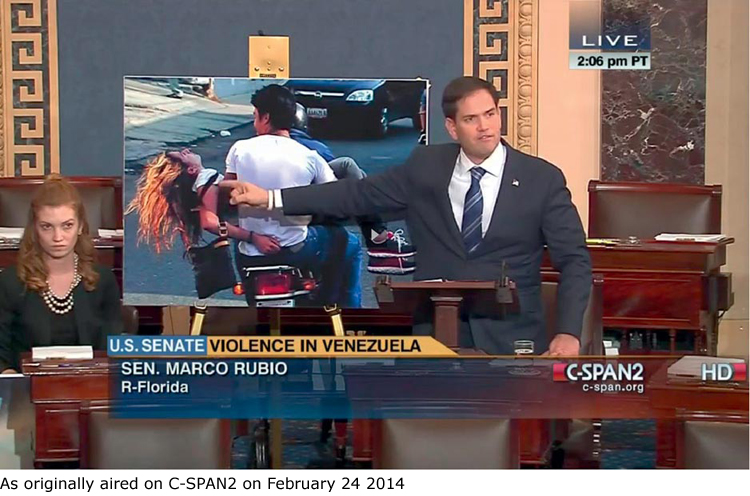Reading Critically for Pathos
Reading Critically for Pathos
On February 24, 2014, Senator Tom Harkin of Iowa, fresh from two “fact-finding” trips to Cuba, described his experiences on the Senate floor in a rambling, forty-minute speech, praising that island nation’s accomplishments in health care and education and urging a normalization of Cuban–American relationships. Later that day, Florida senator Marco Rubio, expecting to speak about growing repression in Venezuela, found it impossible to ignore Harkin’s rosy view of the “fascinating” socialist experiment ninety miles from the coast of the United States. Seizing a kairotic moment, the first-term senator delivered a passionate fifteen-minute rejoinder to Harkin without a script or teleprompter — though Rubio did use posters prepared originally for the Venezuelan talk. After a sarcastic taunt (“Sounded like he had a wonderful trip visiting what he described as a real paradise”), Rubio quickly turned serious, even angry, as he offered his take on the country Harkin had toured:
I heard him also talk about these great doctors that they have in Cuba. I have no doubt they’re very talented. I’ve met a bunch of them. You know where I met them? In the United States because they defected. Because in Cuba, doctors would rather drive a taxi cab or work in a hotel than be a doctor. I wonder if they spoke to him about the outbreak of cholera that they’ve been unable to control, or about the three-tiered system of health care that exists where foreigners and government officials get health care much better than that that’s available to the general population.
The speech thereafter settles into a rhythm of patterned inquiries designed to raise doubts about what Senator Harkin had seen, Rubio’s informal language rippling with contempt for his colleague’s naïveté:
I heard about their [the Cubans’] wonderful literacy rate, how everyone in Cuba knows how to read. That’s fantastic. Here’s the problem: they can only read censored stuff. They’re not allowed access to the Internet. The only newspapers they’re allowed to read are Granma or the ones produced by the government. . . .
He talked about these great baseball players that are coming from Cuba — and they are. But I wonder if they informed him [that] every single one of those guys playing in the Major Leagues defected. They left Cuba to play here. . . .
So it’s great to have literacy, but if you don’t have access to the information, what’s the point of it? So I wish somebody would have asked about that on that trip. . . .
I wonder if anybody asked about terrorism, because Cuba is a state sponsor of terrorism. . . .
Language this heated and pointed has risks, especially when a young legislator is taking on a genial and far more experienced colleague. But Rubio, the son of Cuban immigrants, isn’t shy about allowing his feelings to show. Segueing to his original topic — growing political repression in socialist Venezuela — he uses the kind of verbal repetition common in oratory to drive home his major concern about Cuba, its influence on other nations:
Let me tell you what the Cubans are really good at, because they don’t know how to run their economy, they don’t know how to build, they don’t know how to govern a people. What they are really good at is repression. What they are really good at is shutting off information to the Internet and to radio and television and social media. That’s what they’re really good at. And they’re not just good at it domestically, they’re good exporters of these things.
Rubio’s actual audience in the U.S. Senate was very small, but today all speeches from that chamber are carried nationwide and archived by C-SPAN, and in the age of YouTube, bits and pieces of political addresses reach many listeners. Former speechwriter and Wall Street Journal columnist Peggy Noonan was among those who caught Rubio’s remarks and blogged about them: “We have pressed in these parts for American political figures to speak clearly and with moral confidence about American sympathies in various international disputes. Rubio’s speech is honest political indignation successfully deployed.” You can watch the entire speech on C-SPAN’s Web site (listed as “Rubio Speech on Venezuela”) to see if you agree. And though Cuba and the United States did re-establish diplomatic relationships roughly ten months after the Harkin/Rubio exchange, issues raised by both senators — from health care to the immigration status of Cuban baseball players — will likely be argued for years to come.

RESPOND •
Working with a classmate, make a list of reasons why speakers in highly charged situations might need to use emotional appeals cautiously, even sparingly. What consequences might heightened emotional appeals lead to? What is at stake for the speaker in such situations, in terms of credibility and ethos? What are the advantages of evoking emotions in support of your claims or ideas?